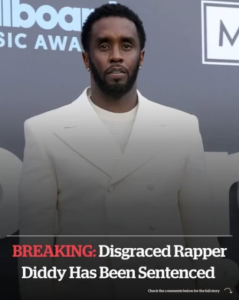Disgraced Rapper Diddy Sentenced: The Fall of a Hip-Hop Empire
Sean “Diddy” Combs, once celebrated as one of the most influential figures in hip-hop and business, has now become the center of one of the biggest scandals in the entertainment industry. The mogul, who built an empire spanning music, fashion, and luxury brands, has officially been sentenced — marking a stunning downfall for a man who once symbolized success, power, and perseverance in the face of adversity.
The courtroom was filled with tension as Diddy stood before the judge. Dressed sharply in a dark tailored suit, he appeared calm but weary. The air was thick with anticipation — reporters, fans, and former associates gathered to witness the moment when justice would be handed down to one of the most polarizing figures in modern pop culture. The judge’s words were clear and heavy: Diddy was being sentenced after months of investigations and allegations that shook both the music and entertainment worlds to their core.
For decades, Diddy had been untouchable. He was the mastermind behind Bad Boy Records, the label that launched the careers of legends like The Notorious B.I.G., Faith Evans, Mase, and many others. His brand wasn’t just about music — it was a lifestyle. He dominated nightclubs, fashion runways, and media headlines. From his clothing line “Sean John” to his business ventures with Ciroc vodka, he was hailed as the blueprint for hip-hop entrepreneurship. But behind the glitz and glamor, whispers of controversy and abuse followed him for years.
The investigation that led to Diddy’s sentencing began with a series of civil lawsuits filed by former associates and partners who accused him of various crimes — from assault to coercion, from harassment to racketeering-like behavior. As more alleged victims came forward, a disturbing pattern began to emerge. The image of the confident, self-made mogul started to crumble as stories of violence, control, and manipulation came to light. The media dubbed it “The Diddy Reckoning.”
Throughout the trial, prosecutors painted a picture of a man who lived a double life. By day, Diddy was the consummate businessman and creative genius; by night, they alleged, he was a man consumed by power, greed, and control. Testimonies described a toxic environment within his empire — one where loyalty was demanded at all costs, and where those who disobeyed or tried to leave faced retaliation.
Diddy’s defense team, however, argued that he was being unfairly targeted. They claimed that his fame and wealth made him an easy scapegoat, that his generosity and bold personality had been twisted by opportunists looking for a payout. They painted him as a victim of “cancel culture,” a man whose past mistakes were being exaggerated for headlines. Yet despite their efforts, the evidence and testimonies proved overwhelming.
When the verdict was read, the courtroom was silent. Diddy showed little emotion, his face a mask of resignation. Some said it was the look of a man who had been preparing for this moment for a long time. Others saw it as the final act of a performer who had spent his life controlling his image, even in defeat.
The sentencing marked a symbolic end to an era. The man once known for throwing lavish parties attended by Hollywood’s elite was now facing years behind bars. Social media exploded with reactions — some expressed satisfaction, saying justice had finally been served, while others lamented the downfall of a cultural icon who had inspired millions to dream big and defy the odds.
Music industry insiders were quick to comment on how Diddy’s conviction would reshape hip-hop’s power structure. For years, he had been a gatekeeper — the one who opened doors for young artists and redefined what it meant to be a mogul. Now, his absence leaves a void and a lesson: that unchecked power and ego can destroy even the most brilliant legacies.
Those who once worked closely with him expressed mixed feelings. Some former employees described the sentence as “bittersweet” — painful to watch but necessary for closure. Others admitted that they had long feared the day when his empire would come crashing down. Several of Diddy’s former collaborators spoke publicly about the need for healing in the music industry, urging greater transparency, protection for artists, and accountability for those in positions of power.
As for Diddy himself, his final statement before sentencing was brief but emotional. “I take responsibility for my actions,” he said, his voice low but steady. “I’ve made mistakes, and I’ve hurt people. I can’t change the past, but I can learn from it. I ask for forgiveness — not from the public, but from those I’ve let down.”
Whether those words were sincere or strategic remains to be seen. What is certain is that Sean “Diddy” Combs will spend years away from the world he once ruled. His music catalog, once a symbol of triumph, now echoes a story of rise and ruin. Record labels have distanced themselves, streaming platforms have paused promotions of his work, and fashion brands once associated with him have quietly removed his name from their products.
In a broader sense, Diddy’s sentencing reflects a cultural shift. The entertainment industry is undergoing a reckoning — one where power no longer guarantees protection, and where the voices of victims are finally being heard. The fall of Diddy serves as both a warning and a reminder: fame can elevate, but it can also corrupt when left unchecked.
For fans who grew up on his music, the news feels surreal. Songs like “I’ll Be Missing You” and “Can’t Nobody Hold Me Down” once represented ambition, resilience, and celebration. Now, they carry a somber weight — reminders of a man who had everything and lost it all.
As Diddy begins his sentence, the world watches to see what becomes of him. Will he retreat into silence, or attempt redemption from behind bars? Will the industry ever forgive him, or is this truly the end of his legacy? Only time will tell. But one thing is clear — the empire of Sean “Diddy” Combs, built on decades of success, has finally fallen.
And in its place stands a cautionary tale about power, accountability, and the high price of living without boundaries — a story that will echo through the halls of hip-hop history for generations to come.


